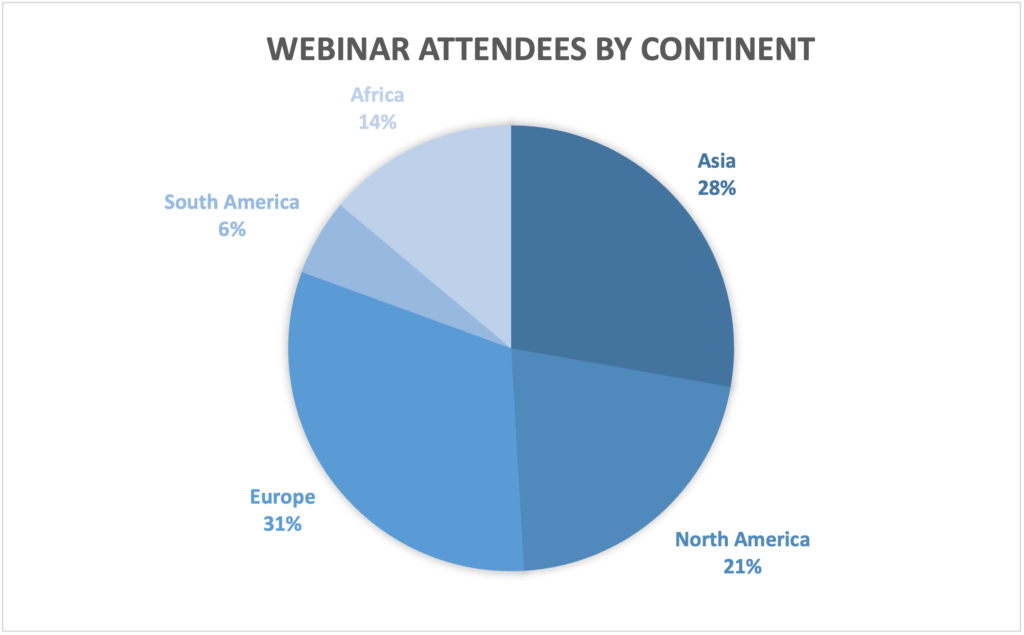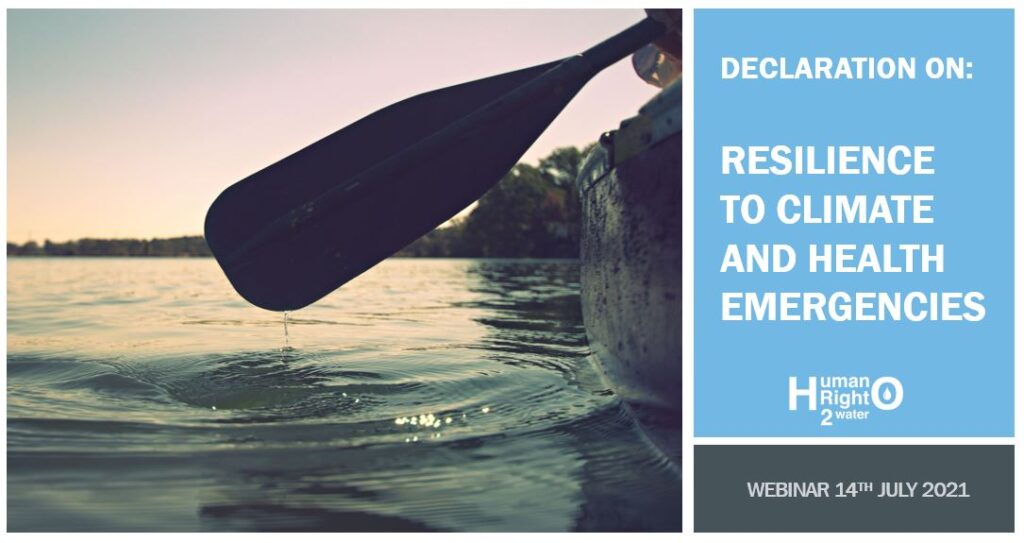Global leaders and experts on human rights to water and sanitation, climate and health were brought together for this discussion on resilience to climate and health emergencies. In preparation for a meeting at COP26 this November, the outcomes of this preliminary webinar will be used to generate support and advocacy for governments to take a proactive role in preventing people from suffering from the impacts of large-scale emergencies. The webinar is based on outcomes from research that has supported the Declaration on Resilience to Climate and Health Emergencies, developed by the Expert Committee of Human Right 2 Water at this launch event.
At the start of the 2020 pandemic many countries rushed to introduce emergency decrees, legislative fixes, and other policies to protect people’s human rights to water and sanitation. Most countries had not anticipated a public health emergency of this kind, and their existing legal framework failed to take account of the stresses on water in emergency situations.
Michel Jarraud, Chair HR2W Expert Committee, welcomed and introduced the background to the development of the declaration on resilience. He stressed the importance of “protecting the human right to water, balancing the various (environmental) requirements, and ensuring that vulnerable members of society maintain affordability and availability to water “. In the keynote presentation, Pedro Arrojo-Adjuda, Special Rapporteur, explained the link between human rights to water and sanitation and resilience.
“Both the pandemic and climate change disproportionally affect those living in poverty and marginalised circumstances”.
HR2W CEO Amanda Loeffen explained how the declaration was developed. “Our methodology, developed as a standardised system of reviewing, collating and referencing law in 23 countries, provides a benchmark and a means of identifying the areas that are most lacking in terms of resilience”. Part 2 of the webinar invited panellists to answer questions received from the attendees. Climate Commissioner and the President of HR2W, Dhesigen Naidoo spoke about “innovative solutions that are increasingly important to build resilience of climate and health emergencies.”
Carol Chouchane Cherfane, Director of the Arab Center for Climate Change politics as ESCWA said that “we have to realise how important this nexus between water, environment, climate and health is from an adaptation perspective”.
Johannes Cullman, Director water, Snow and Ice, WMO stated that he was pleased to recognise that “Climate change is now being implemented in the legal framework, so it is no longer just a scientific reality but governments have also realised that it is a reality.”
Ania Grobicki, the deputy director for external affairs at the Green Climate fund helped to address a question around the link between climate and WASH. She explained that GCF are already working on this and that “Climate finance already includes WASH. The Green Climate fund has invested over 600 million dollars in 18 water projects, including the least developed countries and in Africa, which is our mandate to prioritise”. She added that “we need to understand much more about how to make WASH infrastructure resilient to climate change impacts”
Cindy Kushner, Chief of WASH, UNICEF in Zimbabwe addressed why governments minimize human rights to sanitation and focus more on drinking water? She said there is “a lack of understanding, resources and capacity that underpin the lack of progress and attention,” and that we need to understand why things are the way they are in order to help find solutions.
Rojina Manadhar, Progamme officer, UN Framework Convention on climate change was questioned on how women play a role in climate and health. Her response was to point out that women have very different access to finances and resources compared to men, and that as a result they respond very differently.
Daniel Cano, Expert in Indigenous People and Consultant for the Organisation of merican States, OAS, noted that “resilience is the key to understanding indigenous people and their presence… and that it is part of the core of indigenous cultures across Latin America”. He further added that there is a strong connection between water and land, and that for indigenous peoples,
“water is the blood of mother earth”
Sharmila Murthy, Professor, University of Suffolk, was tasked to answer if there are global laws for those who negatively impact climate and water. In her answer she pointed out that are no global police for tracking the lack of access to resources but that it is important to recognise the role of data in highlighting inequity.
The final section of the webinar asked panellists to state what they are doing to support the declaration in their organisations. The following statements were made by the panellists about work that is ongoing to support the declaration:
UNESCWA – Our organisation is working on the human right to water to increase understanding of the legal and institutional instrument that could inform how countries are resilient to pandemics and climate impacts, Carol Chouchane Chefane
WMO – We can improve the ways that we integrate meteorological models at the climate scale and water forecasts so we can provide better planning and decision-making foundations for policy development and creating resilience systems”, Johannes Cullmann
GCF –The ten declarations are absolutely superb points, and they summarise the due diligence in all of our programmes, including environmental and social safeguards, indigenous persons, gender and integrity, Ania Grobicki.
OAS – It is planned that the declaration will be discussed at the OAS General Assembly in Guatemala, one of the countries with the most indigenous people, Daniel Cano.
UNFCCC – We all have a role to play in alignment with the principles in the declaration. The role of UNFCCC is to support governments in their obligations to the Paris Agreement. This agreement respects human rights, health indigenous peoples, vulnerable people, and gender equality, Rojina Manandhar.


The event attracted an audience of around 200 registrants from all over the globe, including Africa, Asia, and the Americas.
For those of you who were unable to attend, a recording of the webinar is now available.
Find panellists’ slide presentations here: Amanda Loeffen


